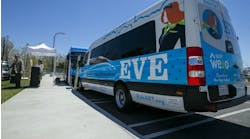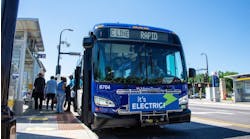Apr. 11—Less than three years after pledging to buy only zero-emission vehicles by 2030, Houston transit officials are finding the road to electric- or hydrogen-powered buses a little bumpier than expected.
"2030 is going to be very difficult to adhere to," said Tom Jasien, interim CEO of Metropolitan Transit Authority.
Meanwhile, 100 new diesel buses will hit Houston streets in the coming months, transit officials said, as reliability trumps sustainability — for now.
Calling the commitment Metro's board made in August 2021 "aspirational," Jasien noted the delays in the agency receiving its first 20 electric buses, slower-than-expected development of other technologies such as hydrogen and recycled natural gas and Metro's own ability to fuel and power new buses as long-established and lingering issues.
"It has been a challenge from day one," Jasien acknowledged. "And it really has not gone away."
Jasien said no changes are being considered for the goal of only buying zero-emission vehicles in six years, but that the board and staff must go wide-eyed into the process and develop a plan for how to integrate new technologies while maintaining the roughly 1,300-bus fleet.
He said Metro is developing a long-term fleet transition plan, which should be initially discussed in May.
As it stands, no single option appears realistic to switch over all the agency's buses. Electric buses have been tested extensively and shown progress, but only one bus manufacturer is proceeding with making electric buses in America at this time, and its ability to deliver the number of buses the nation's agencies will demand remains in doubt.
"Their basic ability to deliver and have the kind of buses and production we would need would have to go up astronomically," Jasien said.
Even the first batch have proved problematic. Buses were delayed by parts shortages and others issues, and even when the first dozen electric buses arrived, many had manufacturing problems that needed correction, notably with battery cells. The issues are being corrected, Metro officials said, but have significantly delayed the new buses hitting the streets.
Adding more to Metro's fleet also would mean upgrading bus garages so they have more charging stations, which requires both time and money.
"Electric has its own infrastructure, which is costly," Metro board member Roberto Treviño said.
In the interim, Metro is buying more diesel buses, approving last month plans to purchase 50 new park and ride buses for $48.1 million and 50 40-foot buses for local transit routes for $40.5 million.
Those buses will start arriving in the coming months, but it could be 18 months before all of them roll into Houston, as bus agencies across the nation have a backlog of new buses, a demand caused by a combination of not buying during the pandemic when needs were unclear and when there were parts and labor shortages.
"You have to get yourself in line for them," Metro board member Bob Fry said.
Despite being diesel, Metro's new buses are still far cleaner than the 15-year-old vehicles they replace, said Chuck Berkshire, Metro's executive vice president and chief operating officer.
"These are replacing first generation diesel hybrids, and the technology has improved," Berkshire said.
Approving the purchases, transit board members and Metro leadership both reiterated the need for reliable buses, and the lack of many viable options. Commuter buses, designed for longer trips with bigger seats set higher off the ground, remain diesel-dominated, as does Metro's internal fueling abilities.
Even if the agency could acquire electric buses or compressed natural gas, keeping them running could pose challenges, officials said. Though the agency has sought to add CNG buses, those coaches also require Metro to adjust by adding fueling stations for them.
The leap to more CNG, however, might be ideal for the lengths Metro — at least for now — can cover.
"Long-term we think CNG is the better alternative," Jasien said, though hydrogen and liquefied gas remain possibilities. "It just seems to have better promise."
What remains in flux is where exactly Metro will need future buses and for which types of trips. Transit use in the region has been upended since the COVID-19 pandemic, with officials balancing providing constant service to provide crucial trips for those reliant on transit, while watching use fluctuate on workdays based on trips to the office. Park and ride service, for example, peaks on Tuesdays, Wednesdays and Thursdays, while falling off precipitously on Mondays and Fridays.
The change in travel patterns is also making some routes shed riders, which in turn means Metro can shift some of those buses elsewhere and operate less frequently.
Pending final approval, Metro staff is planning in June to reduce service on the Silver Line, the region's first bus rapid transit line through Uptown. If approved, large buses would arrive at stations along Post Oak Boulevard every 20 minutes, as opposed to every 12 minutes.
Lessening frequency frees up the large articulated buses for other high-demand routes, but even that comes with complications. The region's busiest bus route, the 82 Westheimer, could use the extra seats on many peak-commuting-period buses, but the street's design won't allow Metro to operate 60-foot buses on the line.
Bus operators already have to squeeze through parts of lower Westheimer east of Montrose by easing into both lanes at times. A project jointly planned by the city and Metro was supposed to rebuild Westheimer, making it one lane in each direction instead of two along most of the area east of Montrose.
Instead, after John Whitmire became mayor, Metro opted to redo the street but keep it two lanes in each direction.
___
(c)2024 the Houston Chronicle
Visit the Houston Chronicle at www.chron.com
Distributed by Tribune Content Agency, LLC.

